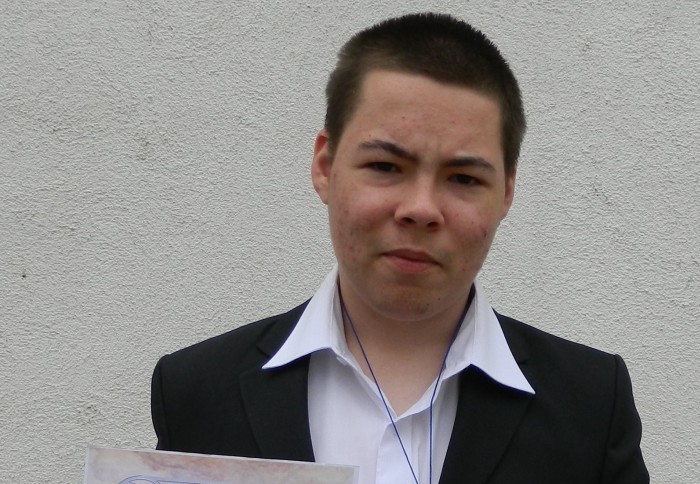New Physics prize celebrates memory of Imperial student Adrian-Gabriel Murariu
by Lucy Jones

The annual prize is funded by a generous gift from Adrian-Gabriel’s father, to celebrate his son and reward outstanding lab work.
A generous donation from Professor Gabriel Murariu, of the University of Galati, Romania, has enabled Imperial’s Department of Physics to establish The Adrian-Gabriel Murariu Prize, a new annual prize in memory of Professor Murariu’s son Adrian-Gabriel who died in 2019. The Prize will be awarded each year to the undergraduate student deemed to be the most outstanding in practical lab work.
A fascination with physics
Adrian-Gabriel Murariu was an exceptional and well-liked student. Adrian-Gabriel gained his BSc in Physics at Imperial in 2019, but sadly died later that year before he could complete his final MSc year. Professor Murariu attended Imperial’s Commemoration Day in October 2019 to accept his son’s degree certificate.
Adrien embodied a sharp scientific mind coupled with a highly sensitive personality characterised by deep humanity. Dr Ingo Mueller-Wodarg Senior Tutor, Department of Physics
Adrian-Gabriel was highly talented and hoped to pursue a career in science. Before joining Imperial, he collaborated and co-authored several science papers with his father, focusing on forestry and water filters data. Whilst at Imperial, Adrian-Gabriel won the 2016 Gloucester Research Prize for academic excellence, showing early promise of a scientific career.
Adrian-Gabriel’s fascination with physics and keenness to know more, often far beyond the syllabus, greatly impressed his lecturers. Fellow students spoke of his quick grasp of intricate mathematical concepts and his talent, intelligence and sense of humour, describing him as a ‘kind, lively person and a great friend.’
Dr Ingo Mueller-Wodarg, Senior Tutor at the Department of Physics, said: “Adrian was a very special student in the Physics Department, admired by students and staff alike. He was known for his fascination and curiosity about Physics, his lucid perception, his sharp and inquisitive mind that went far beyond the syllabus. He showed immense talent, depth of thought and originality for the science but was equally known for his sense of humour applied to so many situations, illustrating his depth of awareness and perception. At the same time, he was unfailingly polite and friendly, a kind person and great friend to many. Adrien embodied a sharp scientific mind coupled with a highly sensitive personality characterised by deep humanity.”
This prize will be awarded to other students who, like Adrian, are passionate about physics. Professor Michele Dougherty Head of the Department of Physics
Professor Michele Dougherty, Head of Imperial’s Department of Physics, said: “We are honoured that Professor Murariu has chosen to remember his son through establishing this prize in the Department. As an undergraduate, Adrian-Gabriel showed great promise and dedication to his studies. This prize will be awarded to other students who, like him, are passionate about physics. I hope that it will be a fitting way for us to remember him, as a community.”
Professor Murariu’s gift will be invested in Imperial’s Endowment, which will ensure the Adrian-Gabriel Murariu Prize can be awarded for many decades ahead. The first prize will be awarded this autumn – it is anticipated that in future years the prize will be presented during Commemoration Day celebrations held within the Department.
Adrian-Gabriel’s father, Professor Gabriel Murariu, reflects on his son’s early achievements in science
 Adrian was an only child. His dream was to study with the elites. During elementary school he showed interest in science. He was happy to participate in all physics, chemistry and earth sciences competitions. In Romania he participated in ten such national competitions. His results were commensurate with his effort. He qualified for the first time in the Romanian National Team to participate in an International Olympics competition when he was 13 years old.
Adrian was an only child. His dream was to study with the elites. During elementary school he showed interest in science. He was happy to participate in all physics, chemistry and earth sciences competitions. In Romania he participated in ten such national competitions. His results were commensurate with his effort. He qualified for the first time in the Romanian National Team to participate in an International Olympics competition when he was 13 years old.
He was an ambitious and hardworking child. His modesty and highly critical spirit were qualities that made him special.
The years passed and when he was 17, Adrian represented Romania at the International Earth Sciences Olympics which was held in Spain. The effort of so many years was realised, and he won a silver medal. He was the first European to climb the podium. My wife and I were so proud of him, as was the school where he studied.
After finishing high school, he arrived in England to enrol in university. Imperial was one of his first options. He was proud that he won a place and during the following years he applied a lot of work and special effort.
He worked hard and didn't know how to compromise. He always tried to get involved in everything that science means. He always tried, as much as possible, to contribute something to each study. As a result, he was able to participate in the writing of a number of articles and received Web of Science indexing.
My wife and I always supported his research interests, and he would have liked to write an article on a research topic during college. He did not finish this article but one day it will be published.
Article text (excluding photos or graphics) © Imperial College London.
Photos and graphics subject to third party copyright used with permission or © Imperial College London.
Reporter
Lucy Jones
Advancement